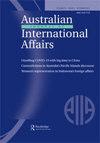Global IR and the middle power concept: exploring different paths to agency
IF 1.8
3区 社会学
Q2 INTERNATIONAL RELATIONS
引用次数: 2
Abstract
ABSTRACT The premise of Global IR for greater pluralism and inclusivity allows for reconsidering the relevance of established concepts in the IR discipline. This article discusses how Global IR can contribute to rethinking the question of agency in the middle power concept. While the concept has been used in a Western and non-Western context, there is a tendency to adopt a binary distinction between Western middle powers that are conformist in their approach to the liberal international order and Southern middle powers that adopt a reformist stance. The article argues that a Global IR approach can help overcome this dichotomy and open up the study of Western and Southern middle powers to new agential possibilities. To demonstrate this, the article discusses how the cases of Australia and Brazil are not limited to conformist and reformist middle power agencies respectively. The discussion shows how the two states have undergone periods of ambivalence to gradually project new forms of middle power agency that alter and redefine their roles within the liberal international order.全球IR与中等权力概念:探索不同的代理路径
全球IR的前提是更大的多元化和包容性,允许重新考虑IR学科中既定概念的相关性。本文讨论了全球国际关系如何有助于重新思考中等大国概念中的代理问题。虽然这一概念在西方和非西方背景下都有使用,但人们倾向于采用一种二元区分,即在自由国际秩序中墨守成规的西方中等大国和采取改革派立场的南方中等大国。本文认为,全球国际关系方法可以帮助克服这种二分法,并为西方和南方中等大国的研究开辟新的代理可能性。为了证明这一点,本文讨论了澳大利亚和巴西的案例如何不局限于墨守成规和改革派的中等权力机构。这一讨论表明,两国如何经历了矛盾的时期,以逐渐规划新形式的中等力量机构,改变和重新定义它们在自由国际秩序中的角色。
本文章由计算机程序翻译,如有差异,请以英文原文为准。
求助全文
约1分钟内获得全文
求助全文
来源期刊

Australian Journal of International Affairs
INTERNATIONAL RELATIONS-
CiteScore
3.20
自引率
13.30%
发文量
44
期刊介绍:
AJIA is the journal of the Australian Institute of International Affairs. The Institute was established in 1933 as an independent and non-political body and its purpose is to stimulate interest in and understanding of international affairs among its members and the general public. The aim of the Australian Journal of International Affairs is to publish high quality scholarly research on international political, social, economic and legal issues, especially (but not exclusively) within the Asia-Pacific region. The journal publishes research articles, refereed review essays and commentary and provocation pieces. ''Articles'' are traditional scholarly articles. ‘Review essays’ use newly published books as the basis to thematically examine current events in International Relations. The journal also publishes commentaries and provocations which are high quality and engaging pieces of commentary, opinion and provocation in a variety of styles. The Australian Journal of International Affairs aims to analyse international issues for an Australian readership and to present Australian perspectives to readers in other countries. While seeking to stimulate interest in and understanding of international affairs, the journal does not seek to promote any particular policies or approaches. All suitable manuscripts submitted are sent to two referees in a full ''double blind'' refereeing process.
 求助内容:
求助内容: 应助结果提醒方式:
应助结果提醒方式:


